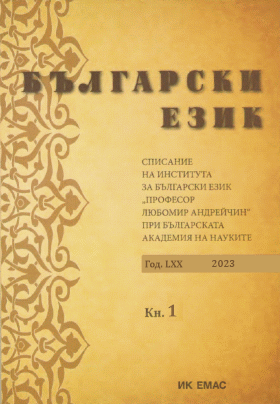Въпроси на правоговора на съвременния български книжовен език
Contemporary Standard Bulgarian: Issues in Orthoepy
Author(s): Tatyana AleksandrovaSubject(s): Language studies, Language and Literature Studies, Theoretical Linguistics, Applied Linguistics, Philology
Published by: Институт за български език „Проф. Любомир Андрейчин“, Българска академия на науките
Summary/Abstract: Most of the papers featured in Issue 1/2023 of the Journal present results from the project Language Competence and Language Policies. A Typology of the Deviations from the Orthoepic Norms carried out by the Department of Modern Bulgarian Language at the Institute for Bulgarian Language. In her paper On the Codification of Some Pronunciation Norms in the First Official Codification of Standard Bulgarian and in Early-20th Century Spelling Dictionaries and Handbooks Katya Charalozova discusses the history of the codification of some aspects of the pronunciation norms of standard Bulgarian, centring on the rules governing the pronunciation of the Old Bulgarian yat vowel, vowel reduction and the pronunciation of verb endings. Tatyana Aleksandrova explores Characteristic Features of Standard Spoken Bulgarian Relevant to the Codification of Pronunciation Norms, focusing on the difference between orthoepic and spelling norms in light of the codification of the rules of spoken Bulgarian. The author summarises the conditions, factors and challenges involved in the codification of standard spoken Bulgarian and reveals the peculiarities of the oral and written forms of the language and the relationship between them, along with the way these characteristics relate to language codification. Milen Tomov proposes A Typology of the Questions on Pronunciation in the Practice of Language Consulting based on an analysis of the inquiries received at the Language Consultation Service. The author defines the place of orthoepy in the overall picture of language consulting and offers a characterisation and thematic classification of the inquiries dealing with correct pronunciation. The study focuses on the limited interest in pronunciation-related phenomena and norms and the significant predominance of ques-tions concerned with the spelling. Iliyana Kuneva and Zhaneta Zlateva study the Stress Patterns of Some Nouns Denoting Persons in Bulgarian. The authors analyse the pronunciation of Bulgarian nomina habitatorum as well as of some other types of nouns denoting persons in which different stress patterns are observed. On the basis of a selection of words from the current Official Spelling Dictionary they identify types of words that show variation in the position of the stress as well as normative issues stemming from these differences. In her paper Degree of Recognizability of the Pro-nunciation of [-ъ] in the Definite Article of Feminine Nouns Ending in a Consonant as Non-standard in comparison with the Standard Pronunciation Malina Stoycheva aims at establishing to what extent native speakers of Bulgarian perceive as incorrect the pronunciation of the vowel sound of the stressed definite article morpheme as -ъ (e.g, [обичтъ], [есентъ]) in comparison with the standard pronunciation. The analysis is based on empirical data obtained through a non-representative study employing the method of listening to a short text. Outside the scope of the main topics tackled in this Issue, Natalia Długosz and Andreana Eftimova present An Experimental Study of the Meaning and Adaptation of Composita with the Components ковид- and корона- in the Bulgarian Linguistic Conscious-ness in which they analyse the data obtained from the Bulgarian respond-ents in a Polish-Bulgarian contrastive experimental study. Based on the results of the component and distributional analysis of the meaning of three composita: ковидтуризъм (covid tourism), ковидкупон (covid party) and коронапаника (corona panic), the authors demonstrate the lack of a single predominant meaning of the words under study. The most clearly and consistently conceptualized one as reflected in the consciousness of young Bulgarians is the compositum коронапаника.
Journal: Български език
- Issue Year: 70/2023
- Issue No: 1
- Page Range: 11-12
- Page Count: 2
- Language: Bulgarian

